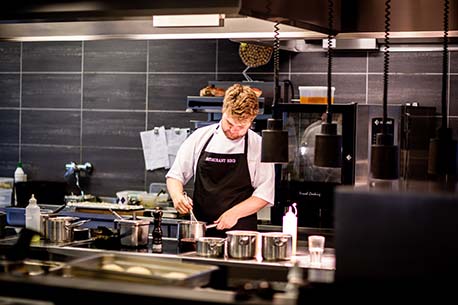
20 Dec Commercial Kitchen Flooring – What to bear in mind?
Choosing the right commercial kitchen flooring is a vital part of the health and safety measures to keep your employees and customers safe. As you know, the flooring in commercial kitchens is subjected to severe punishment on a daily basis, from hot oil splatters and extreme temperature changes to high humidity, dropped metal pans and heavy footfall.
At the same time, regulations are strict and commercial kitchens are closely monitored by health inspectors. With foodborne diseases on the rise, ensuring all that kitchen surfaces are well-maintained and sanitary is ever more vital. It’s also worth remembering that any maintenance or hygiene issues can lead to fines or even closure, causing a potential loss of revenue.
If you’re choosing a commercial kitchen floor, these are the most important considerations to bear in mind:
Hygiene
In environments where food is handled, ensuring the highest standards of hygiene must be top of the list. Nothing is more vital than preventing the potential growth and spread of foodborne bacteria and pathogens, which can harm both employees and customers.
Tiled floors inevitably mean exposed grout that can become porous or crack, leading to tiny spaces where food particles can enter leading to bacterial growth.
Virtually seamless flooring materials are the most hygienic option. They can be installed on a concrete substrate using a special adhesive that is resistant to moisture, thus preventing pathogen growth.
Slip-resistance
Kitchen floors are subjected not only to water, but to a range of food products from oils and grease to flour, salt and sugar. Each of these can cause potential dangers to employees working in the vicinity. To minimise the danger of slips and falls, textured flooring can offer the underfoot traction required to prevent accidents.
Different flooring options offer a variety of textures to suit the demands of any kitchen environment. The right balance needs to be struck between good grip and ease of cleaning.
Ease of cleaning
Kitchen floors must be easy to clean. The method of cleaning can vary from kitchen to kitchen. If the floor is likely to be steam cleaned or mopped with very hot water, it’s important to ensure that the flooring chosen can withstand such high temperatures.
Durability
Commercial kitchen floors must be able to withstand spillages of hot oil, harsh detergents and abrasive acids. They also need to handle impacts from dropped heavy pans and the constant foot traffic from kitchen staff.
Kitchen floors are exposed to extremes of temperatures from the frigid cold of freezer units to the searing heat of cooking areas. They will often be subjected to steam-cleaning or hot spray washing.
It is therefore important that the chosen flooring material is not only strong and durable, but is also thermal shock resistant.
Water resistance
Commercial kitchens are high in moisture. There’s the humidity generated from cooking, dishwashing and cleaning, which will lead to condensation on the floor. Then there’s the risk of moisture vapor transmission (MVT) coming from the concrete under the floor or even the soil itself.
The flooring material must be able to withstand surface moisture while mitigating the possibility of MVT.
If you’re thinking about installing a new floor for your commercial kitchen, it’s best to discuss your individual requirements with a professional. Make sure you factor in the time your kitchen will be out of action during the installation period.
Want to know more about your commercial kitchen flooring options? At Easifit Flooring, we specialise in commercial kitchen flooring. Talk to our team of experts for more ideas and advice. Reach us on 0800 096 1171 or drop us a line at .
December 20, 2019

































